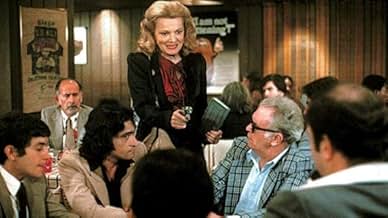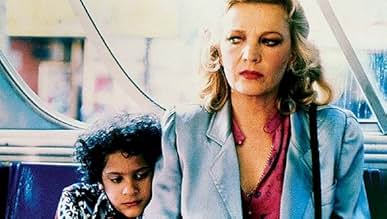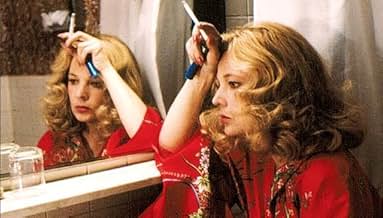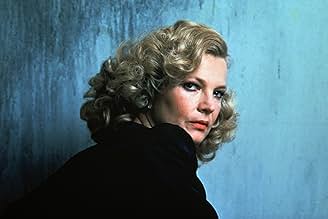IMDb-BEWERTUNG
7,1/10
12.654
IHRE BEWERTUNG
Als die Familie eines Jungen von der Mafia getötet wird, wird die taffe Nachbarin Gloria zu seinem widerwilligen Vormund. Im Besitz eines Buches, das die Gangster haben wollen, gehen die bei... Alles lesenAls die Familie eines Jungen von der Mafia getötet wird, wird die taffe Nachbarin Gloria zu seinem widerwilligen Vormund. Im Besitz eines Buches, das die Gangster haben wollen, gehen die beiden in New York auf die Flucht.Als die Familie eines Jungen von der Mafia getötet wird, wird die taffe Nachbarin Gloria zu seinem widerwilligen Vormund. Im Besitz eines Buches, das die Gangster haben wollen, gehen die beiden in New York auf die Flucht.
- Für 1 Oscar nominiert
- 4 Gewinne & 5 Nominierungen insgesamt
Gary Howard Klar
- Irish Cop
- (as Gary Klar)
Empfohlene Bewertungen
From its buildings, to its busy streets. From the people in the city, to the culture that created it, John Cassavetes perfectly captures the true essence of NYC. The true grit of the city, the core of the apple. The setting of the film is real. Unlike the remake almost twenty years later, NYC does not look like a commercial Disney Land without Mickey. Watching the film, you can smell the dirty hallways in the lower middle class hotels. You can hear the crowded Hispanic neighborhoods. And you can see what NYC is really like in Gloria.
Jack Dawn has let slip to his mob employers that he has kept a book of all transactions. Jeri Dawn has just seen some men lingering in the lobby downstairs. Together they realise that the hit has come and they start to try to leave. They give their youngest son, Phil, to neighbour Gloria to offer some hope for him although before leaving, Jack gives him his account ledger as protection. The mob slaughter the Dawn family but Phil and Gloria get away; however, with the information in their possession, Gloria soon finds that the mob still want the book back and the kid dead will Gloria's former relationship with members of the mob help or hinder her? With so many good things generally said about this film, I thought I'd better give it a go despite already having seen the remake. The good things about it are generally true it is quite engaging, Rowlands is pretty good and it is a bit tense. However I couldn't help but feel that the strengths were more than cancelled out by the weaknesses, not making it a bad film but making it only an OK one. The plot is gripping enough and has been redone several times since this film but somehow it doesn't always ring true and this criticism can be carried across to the lead character. Would she really greet each mobster with spits of "punk" etc and always be pulling a gun, perhaps in fear she would but here she looks like she is in control. In terms of her character, she is harsh to the kid but yet never shows the growing affection that we assume must be the reason she cannot bring herself to do the wrong thing and hand over the kid. She shows it right at the end but it is too late to be convincing by then.
This is not to take away from her performance, because it is strong, but it is not convincing as a person. Cassavetes has crafted a tough female but has done so to the point where she seems a few steps off being the Terminator. Adames may well be trying his best but he is annoying and his character was totally absent again not helped by the fact his material doesn't sound anything like a real person; contrast him with Portman in Leon and you'll see what a negative impact he had on the film. The mobsters are all Italian goons of the classic stereotype and they add nothing to the film in the way of actual menace. Cassavetes has done the job as director though and the film is quite tense while also capturing the city of New York of the time very well in regards atmosphere and grit.
Overall this is an OK film with an OK plot that is OK if you can get passed how unconvincing it all is. However it is no classic and the weaknesses and problems are difficult to ignore. Worth watching and perhaps better if you have low expectations but it is certainly anything like as good as its awards, names and reputation suggests that it will be.
This is not to take away from her performance, because it is strong, but it is not convincing as a person. Cassavetes has crafted a tough female but has done so to the point where she seems a few steps off being the Terminator. Adames may well be trying his best but he is annoying and his character was totally absent again not helped by the fact his material doesn't sound anything like a real person; contrast him with Portman in Leon and you'll see what a negative impact he had on the film. The mobsters are all Italian goons of the classic stereotype and they add nothing to the film in the way of actual menace. Cassavetes has done the job as director though and the film is quite tense while also capturing the city of New York of the time very well in regards atmosphere and grit.
Overall this is an OK film with an OK plot that is OK if you can get passed how unconvincing it all is. However it is no classic and the weaknesses and problems are difficult to ignore. Worth watching and perhaps better if you have low expectations but it is certainly anything like as good as its awards, names and reputation suggests that it will be.
I caught this on TV once and was blown away by its energy and spontaneity. Gena Rowlands is as good in it as everyone says, with some real surprises. The point about the kid coming out with "grown up" mock-heroic phrases at some points is that he's picked all that stuff up from the movies and listening to his parents' gangster friends. It's supposed to be funny - he keeps shouting "I'm the Man" when he patently isn't.
The movie takes action/gangster movie genre conventions by the scruff of the neck and shakes them till interesting stuff falls out. The editing and cinematography are great. New York looks gritty but beautiful.
True the film is kind of rough round the edges, I guess down to Cassavetes' improvisatory style, however it's a lot more accessible than most of his work and you should see it if you get the chance.
The movie takes action/gangster movie genre conventions by the scruff of the neck and shakes them till interesting stuff falls out. The editing and cinematography are great. New York looks gritty but beautiful.
True the film is kind of rough round the edges, I guess down to Cassavetes' improvisatory style, however it's a lot more accessible than most of his work and you should see it if you get the chance.
You start with flinty, streetsmart gangster types, cross their paths with a little kid, put them in urban peril, and then you squeeze how things stack up for sentimentality, suspense and humor. It's a charming idea, and perhaps that's why this could be considered John Cassavetes's most conventional film. It tells the story of a gangster's girlfriend who goes on the run with a young boy who is being pursued by the mob for information he doesn't even know he might have. But he wants to tell the story his own way, obstructing every convention we would normally expect, instilling a realist perspective in how we follow the movie, making the pay-off that much more worthwhile. Cassavetes didn't intend to direct his script. He just wanted to sell the story to Columbia Pictures. But once his wife Gena Rowlands was asked to play Gloria, she obliged Cassavetes to direct it.
This underdog crime drama is particularly absorbing in its first hour, and ignites with a great beginning. We follow one character, it leads to another character, perspectives are interknit, the situation builds and Cassavetes has complete control over what we know and expect, all in spite of the all-too-familiar premise, which is then set for the rest of the movie, which is a cat-and-mouse hunt per the seedier locales of New York and New Jersey. He makes the threat so real that when the two key characters evade tangible danger, we still feel the tension whenever they round a corner, get in and out of cabs, and other such ordinary actions. He doesn't let on that unwanted company is present. It just happens. There is one scene that lasts for quite awhile before we realize, after Rowlands's title character does, that unwanted company has been there the entire time.
In an Oscar-nominated performance, Rowlands is expectedly the beautiful lead actress, but she sports a kind of masculine quality, creating a much more dense dynamic when she, afraid of her maternal instincts, finds them overpowering her lifelong self-preservation, and begrudgingly protects the boy. As the film progresses, however, she becomes more sincere in her protection, and integrates her love with her seasoned familiarity with how to stay alive in this town. In one creative take on the Fine, I Don't Need You Anyway scene, she asks a bartender, "There's reasons I can't turn and just look, but is there a little kid headed in here or across the street or whatever?" She drives her role with such honest irritable liveliness. Yet the kid is also well cast. He was a conspicuous little boy named John Adames with dark hair, big eyes and a way of trucking his dialogue as if confronting you to adjust a single word. It all works because everything about his character, the way he dresses, talks, revolts and moves, serves the naive notion that he is older, smarter and cooler than he is.
Cassavetes has a natural keenness for guilelessly unadorned location shooting in that he never plans, stages, waits on the weather or time of day, or hires extras or stunt drivers. Note how passers-by in the distance will often look on at the characters, whether Gloria has pulled a gun in a public place or not. Wherever the characters need to be, that place is in real time, as dirty, scuzzy and purely of the film's era as it would've normally been. There's a shabby flophouse where the clerk tells Gloria, "Just pick a room. They're all open." There are bus stations, back alleys, dimly lit hallways, and bars that open at dawn. And his occasional action scenes are so thrilling because of their surprise.
For once, Cassavetes doesn't stage indefinitely extensive scenes of dialogue wherein the actors indulge in their own view of their characters' unraveling. But I miss that. As I've already said, I am very impressed with how tightly he mounts suspense from the very beginning, how Gloria and the kid zip from cab to bus to cab to street to hotel to cab and so on. But regardless of how doggedly realistic he is in his portrayal of a recycled movie plot, he still relies upon that plot rather than the impositions of his characters flexing their wings.
This underdog crime drama is particularly absorbing in its first hour, and ignites with a great beginning. We follow one character, it leads to another character, perspectives are interknit, the situation builds and Cassavetes has complete control over what we know and expect, all in spite of the all-too-familiar premise, which is then set for the rest of the movie, which is a cat-and-mouse hunt per the seedier locales of New York and New Jersey. He makes the threat so real that when the two key characters evade tangible danger, we still feel the tension whenever they round a corner, get in and out of cabs, and other such ordinary actions. He doesn't let on that unwanted company is present. It just happens. There is one scene that lasts for quite awhile before we realize, after Rowlands's title character does, that unwanted company has been there the entire time.
In an Oscar-nominated performance, Rowlands is expectedly the beautiful lead actress, but she sports a kind of masculine quality, creating a much more dense dynamic when she, afraid of her maternal instincts, finds them overpowering her lifelong self-preservation, and begrudgingly protects the boy. As the film progresses, however, she becomes more sincere in her protection, and integrates her love with her seasoned familiarity with how to stay alive in this town. In one creative take on the Fine, I Don't Need You Anyway scene, she asks a bartender, "There's reasons I can't turn and just look, but is there a little kid headed in here or across the street or whatever?" She drives her role with such honest irritable liveliness. Yet the kid is also well cast. He was a conspicuous little boy named John Adames with dark hair, big eyes and a way of trucking his dialogue as if confronting you to adjust a single word. It all works because everything about his character, the way he dresses, talks, revolts and moves, serves the naive notion that he is older, smarter and cooler than he is.
Cassavetes has a natural keenness for guilelessly unadorned location shooting in that he never plans, stages, waits on the weather or time of day, or hires extras or stunt drivers. Note how passers-by in the distance will often look on at the characters, whether Gloria has pulled a gun in a public place or not. Wherever the characters need to be, that place is in real time, as dirty, scuzzy and purely of the film's era as it would've normally been. There's a shabby flophouse where the clerk tells Gloria, "Just pick a room. They're all open." There are bus stations, back alleys, dimly lit hallways, and bars that open at dawn. And his occasional action scenes are so thrilling because of their surprise.
For once, Cassavetes doesn't stage indefinitely extensive scenes of dialogue wherein the actors indulge in their own view of their characters' unraveling. But I miss that. As I've already said, I am very impressed with how tightly he mounts suspense from the very beginning, how Gloria and the kid zip from cab to bus to cab to street to hotel to cab and so on. But regardless of how doggedly realistic he is in his portrayal of a recycled movie plot, he still relies upon that plot rather than the impositions of his characters flexing their wings.
Good movies are timeless. Or they feel so. Sometimes this is because their subject is universal and it does not really matter what epoch the action is set in. In some other cases the quality of the story and of the acting make the period irrelevant. A good example is 'Gloria', a film made in 1980 by director (and actor) John Cassavetes about whom I knew very little before seeing this film. And yet, 'Gloria' is a gangster movies that keeps the interest of viewers all over the two hours of screen time and looks new and fresh, despite having been filmed almost 40 years ago.
The subject of the film will look familiar, as later movies like Luc Besson's 'Léon' have dealt with the theme of gangsters involved folks meeting and befriending kids, and melting to humanity in the course of the story. 'Gloria' however included from start a big twist. The lead adult hero is a woman, the ex-girlfriend of one of the mob chiefs, who witnesses the murder of the family of a six years old kid (her neighbor) who has nobody left to care about him and no place to go. Taking him under her protection means placing her in conflict with the mob (as the kid holds an accounting book with compromising mafia secrets) and with the law (she is believed to have kidnapped the kid). What follows is a few days of running from everybody and fighting for survival in the New York of 1980.
The New York in the film is a city that looks so familiar: the streets (much dirtier and more dangerous), the buildings (combining modern and decrepit), the skyline (with the painful silhouettes of the twin towers), the people who look so much the same as the diverse human landscape of the big city we know. The only major thing that seems to have changed is the value of the dollar. It may be as difficult as 40 years ago to change a 100 dollars bill, but two dollars fifty cents would not be sufficient nowadays for any room in a city hotel, probably not even for a tip in any city hotel. The other ingredient that makes the film interesting is the excellent acting performance of Gena Rowlands who partners with the young John Adames, a kid actor who did not grow into an adult actor. She is vulnerable as a woman who does not like kids (her cat is collateral damage in the first minutes of the film) and has a troubled past, yet strong as she knows the language and manners of the crime world and how to survive it. The ending is a little disappointing, unexpectedly conventional for such a film that is so non-conventional from many points of view, but this does not spoil too much the good impression left by this fresh classic.
The subject of the film will look familiar, as later movies like Luc Besson's 'Léon' have dealt with the theme of gangsters involved folks meeting and befriending kids, and melting to humanity in the course of the story. 'Gloria' however included from start a big twist. The lead adult hero is a woman, the ex-girlfriend of one of the mob chiefs, who witnesses the murder of the family of a six years old kid (her neighbor) who has nobody left to care about him and no place to go. Taking him under her protection means placing her in conflict with the mob (as the kid holds an accounting book with compromising mafia secrets) and with the law (she is believed to have kidnapped the kid). What follows is a few days of running from everybody and fighting for survival in the New York of 1980.
The New York in the film is a city that looks so familiar: the streets (much dirtier and more dangerous), the buildings (combining modern and decrepit), the skyline (with the painful silhouettes of the twin towers), the people who look so much the same as the diverse human landscape of the big city we know. The only major thing that seems to have changed is the value of the dollar. It may be as difficult as 40 years ago to change a 100 dollars bill, but two dollars fifty cents would not be sufficient nowadays for any room in a city hotel, probably not even for a tip in any city hotel. The other ingredient that makes the film interesting is the excellent acting performance of Gena Rowlands who partners with the young John Adames, a kid actor who did not grow into an adult actor. She is vulnerable as a woman who does not like kids (her cat is collateral damage in the first minutes of the film) and has a troubled past, yet strong as she knows the language and manners of the crime world and how to survive it. The ending is a little disappointing, unexpectedly conventional for such a film that is so non-conventional from many points of view, but this does not spoil too much the good impression left by this fresh classic.
Wusstest du schon
- WissenswertesActress Gena Rowlands once said of her ex-gun moll character: "When I read the script, I knew I wanted a walk for her. I wanted something that, from the minute you saw me, you knew I could handle myself on the streets of New York. So I started thinking about when I lived in New York, how different I walked down the street when there was nobody but me. It was a walk that said, they'd better watch out."
- PatzerWhen Phil boards the train, the shot has been reversed, as evidenced by backwards lettering on the signs on the train and the platform.
Top-Auswahl
Melde dich zum Bewerten an und greife auf die Watchlist für personalisierte Empfehlungen zu.
- How long is Gloria?Powered by Alexa
Details
- Erscheinungsdatum
- Herkunftsland
- Offizielle Standorte
- Sprachen
- Auch bekannt als
- One Summer Night
- Drehorte
- Trinity Church Cemetery - 770 Riverside Drive, Manhattan, New York City, New York, USA(ending scene at Pittsburgh cemetery)
- Produktionsfirma
- Weitere beteiligte Unternehmen bei IMDbPro anzeigen
Box Office
- Bruttoertrag in den USA und Kanada
- 4.059.673 $
- Eröffnungswochenende in den USA und in Kanada
- 33.767 $
- 5. Okt. 1980
- Weltweiter Bruttoertrag
- 4.062.212 $
Zu dieser Seite beitragen
Bearbeitung vorschlagen oder fehlenden Inhalt hinzufügen































